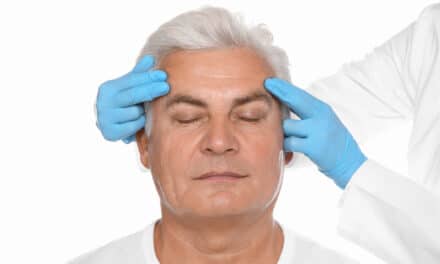Botox jabs could offer a long-lasting solution for those who suffer the discomfort and embarrassing ‘blushing’ of rosacea.
When tiny droplets of the wrinkle-busting nerve toxin are injected in diluted form into the forehead and cheeks, they have been found to reduce the redness which is the main symptom of the incurable skin disease.
The breakthrough has been shown in early-stage trials to help all forms of the condition, including those characterised by acne-like spots on the face, and the severe skin-thickening form rhinophyma.
Rosacea most usually causes episodes of flushing or blushing of the skin, most commonly on the cheeks, chin, forehead and nose.
Over time, the redness becomes permanent – known as erythema – and some sufferers also have visible red, broken veins.
The cause is not fully understood, but it is thought the defect lies in the blood vessels in the skin of the face, which dilate too easily.
Triggers for flare-ups include alcohol, intense exercise, high and low temperatures, spicy foods, stress, lack of sleep, and sunlight.
Celebrities including Bridget Jones actress Renee Zellweger, Hollywood star Cameron Diaz and Sex In The City’s Cynthia Nixon are all said to suffer.
There is no known cure, although several treatments, including antibiotic creams and tablets, may help control symptoms.
Hopes were raised recently by the development of a new gel that is applied to the face and causes the blood vessels to contract, dramatically reducing erythema. However, the effect lasts less than 12 hours, and side effects included a worsening of the condition in some patients once treatment stopped.
Now authors of a new study believe Botox inhibits a compound found in the skin called vasoactive intestinal protein (VIP), which is believed to be involved in regulating the dilation of blood vessels.
So, instead of causing blood vessels to artificially shrink, it is thought to work by stopping them from dilating in the first place.
VIP is said to be found in greater concentration in the skin of those with inflammatory conditions such as rosacea.



